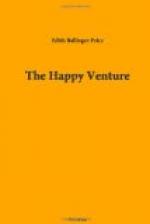Ken lighted his sister’s candle for her, and took his own into the room he shared with Kirk. There was no fear of candle-light waking Kirk. He was very sound asleep, with the covers thrown about, and Ken stood looking at him for some time, with the candle held above his brother’s tranquil face. “I wonder where he’d have been sleeping to-night if I hadn’t come along just about when I did?” mused Ken. “The innocent little youngster—he never supposed for a minute that the rapscallion would do anything but take him home. How’s he ever going to learn all the ways of the wicked world? And what ever possessed him to shoot off the Toad Pome to the Maestro?”
Ken put the candle on the bureau and undid his necktie.
“The blessed little goose!” he added affectionately.
There is nothing like interesting work to make time pass incredibly quickly. For the Sturgises were interested in all their labors, even the “chores” of Applegate Farm. It goes without saying that Kirk’s music—which was the hardest sort of work—absorbed him completely; he lived in a new world. So, almost before they could believe it, September came, filling the distance with tranquil haze, and mellowing the flats to dim orange, threaded with the keen blue inlets of the bay. Asters began to open lavender stars at the door-stone of Applegate Farm; tall rich milkweed pressed dusty flower-bunches against the fence, and the sumach brandished smoldering pyramids of fire along the roadsides.
Ken came home late, whistling, up from Asquam. Trade for the Sturgis Water Line was heavy again just now; the hotels and cottages were being vacated every day, and more baggage than the Dutchman could carry lay piled in the Sturgis “warehouse” till next morning. Ken’s whistle stopped as he swung into Winterbottom Road and began to climb the hill. Just at the crest of the rise, where the pale strip of road met the twilight of the sky, the full moon hung, a golden disc scarcely more luminous than the sky around it. As he moved up the hill, it moved also, till it floated clear of the dark juniper-trees and stood high above them. Crickets were taking up their minor creaking, and there was no other sound.
Through the half dusk, the white chimneys of Applegate Farm showed vaguely, with smoke rising so lazily that it seemed almost a stationary streak of blue across the trees. What a decent old place it was, thought Ken. Was it only because it constituted home? No; they had worked to make it so, and it had ripened and expanded under their hands.
“I shouldn’t mind Mother’s seeing it, now,” Ken reflected.
He sighed as he remembered the last difficult letter which he and Phil had composed—a strictly truthful letter, which said much and told nothing. He wondered how much longer the fiction would have to be sustained; when the doctor at Hilltop would sanction a revelation of all that had been going on since that desolate March day, now so long ago.




